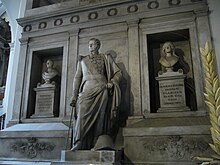Carlo Filangieri
Carlo Filangieri , Prince of Satriano and Duke of Taormina (born May 10, 1784 in Cava de 'Tirreni near Salerno , † October 14, 1867 in Portici ) was an Italian general .
Life
Filangieri was born the son of the lawyer Gaetano Filangieri and joined the French army as a lieutenant . At Austerlitz he was honored in 1805 and took part in the siege of Gaëta . In 1811 he returned to Naples and was promoted to colonel by Murat . In 1815 he took part in the uprising as adjutant general . He was promoted to lieutenant general by Murat under Ferdinand I. Inspector General of the Infantry .
In 1821 he took part in Carrascosa's campaign in Abruzzo , but was replaced in 1822. It was not until 1831 that he was returned to military service and on August 29, 1848, Ferdinand II entrusted him with the supreme command against the rebellious Sicily . He had Messina bombarded from September 7th to 9th, triumphed at Taormina , Catania and Syracuse and in 1849 advanced to Palermo . Here he was about to storm the city when the united English and French prevented him by forcing them to surrender. On October 9, 1849, he was appointed general and governor of Sicily and was lenient in this position. This in turn made him unpopular with Ferdinand II and so he had to resign in 1854. On March 19, 1850, Friedrich Wilhelm IV awarded him the Pour le Mérite .
Franz II commissioned him on June 9, 1859 to chair the cabinet and the war ministry. However, he resigned from these offices in November 1859 and on February 7, 1860.
Carlo Filangieri died in Portici on October 14, 1867.
literature
- Jaromir Hirtenfeld : The Military Maria Theresa Order and its Members, Vol. 4: 1823-1850 . Imperial and Royal Court and State Printing Office Vienna 1857, pp. 1723–1724.
Individual evidence
- ^ Karl-Friedrich Hildebrand , Christian Zweng: The knights of the order Pour le Mérite 1740-1918 . Biblio Verlag, Bissendorf 1998, ISBN 3-7648-2473-5 , p. 389.
| personal data | |
|---|---|
| SURNAME | Filangieri, Carlo |
| BRIEF DESCRIPTION | Italian general |
| DATE OF BIRTH | May 10, 1784 |
| PLACE OF BIRTH | La Cava near Salerno |
| DATE OF DEATH | October 14, 1867 |
| Place of death | Portici |

